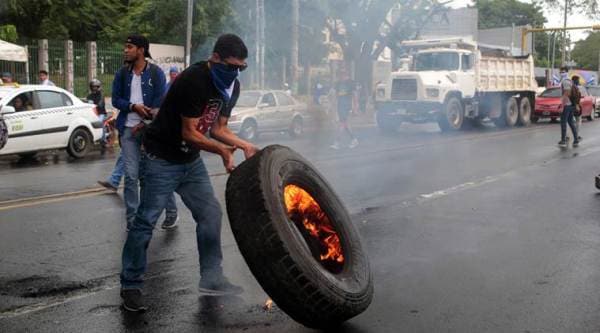At least 317 dead in Nicaragua unrest: OAS
President Daniel Ortega has acknowledged 195 dead, while the independent Nicaraguan Pro-Human Rights Commission has reported 450.

A demonstrator tries to extinguish a burning tyre after university students blocked a street during a protest to demand Nicaragua’s President Daniel Ortega’s government the budgets for the university in Managua, Nicaragua August 2, 2018. REUTERS/Oswaldo Rivas
The human rights arm of the Organization of American States said Thursday that 317 people have been killed during violence surrounding anti-government protests in Nicaragua that began in April.
The Inter-American Commission on Human Rights said the toll included 23 minors and 21 police officers.
1m 7s
President Daniel Ortega has acknowledged 195 dead, while the independent Nicaraguan Pro-Human Rights Commission has reported 450.
The report came as the OAS adopted a resolution calling for the creation of an OAS working group to promote nationwide dialogue for peace. Nicaraguan Foreign Minister Denis Moncada rejected the idea, calling it an “interventionist political maneuver.”
“This idea is raised when the attempted coup against President Ortega was already neutralized and while Nicaragua gradually restores its daily life and economy,” he said.
The OAS rights body said it had verified that Nicaragua’s government has persecuted and criminalized protesters. It said that after protest barricades were forcibly removed between July 19 and 30, authorities used armed hooded men to execute arbitrary and violent arrests. Detainees were not informed of their rights or the charges against them, it added.
The commission urged Nicaraguan officials “to promptly and seriously investigate each of these crimes.”
Jose Miguel Vivanco, director of the Americas division for Human Rights Watch, praised the resolution adopted by OAS, calling it “the greatest institutional promotion in defense of democracy and human rights” by the regional body in recent times.
The resolution was adopted by 20 votes in favor, eight abstentions and four votes against. The proposal was introduced by Argentina, Brazil, Canada, Colombia, Chile, Mexico, Peru and the United States.
Mexican Ambassador Jorge Lomonaco noted that Nicaragua’s government previously rejected other OAS initiatives but later accepted them. “This is the way diplomatic processes are. It is part of the negotiations,” he said.
He added that the resolution’s adoption was important because that while several OAS bodies are already working in Nicaragua, “one ingredient was missing: the role of the united countries. This resolution adds that.”
The resolution came less than two weeks after the OAS condemned human rights violations committed by Nicaraguan police and pro-government armed civilian groups.
In April, Ortega asked the Roman Catholic Church to mediate in the political unrest, but that effort was suspended after the president refused to give up power before elections scheduled for 2021. Ortega has since criticized church leaders, and his supporters have been accused of harassing and attacking priests.







































No hay comentarios:
Publicar un comentario